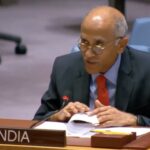India’s Permanent Representative to the United Nations, Ambassador Parvathaneni Harish, has urged the world body to undertake comprehensive reforms that reflect modern geopolitical realities and give the Global South a stronger voice in decision-making.
Speaking at the UN Security Council’s Open Debate on “The United Nations Organization: Looking into the Future” on October 24, 2025, Ambassador Harish emphasized that while the UN was founded as a “beacon of hope” for peace and security, it has over time “lost its unique identity and foundational focus.”
Ambassador Harish began his remarks by extending appreciation to Russia for convening the debate on the occasion of United Nations Day, and to Secretary-General António Guterres for his briefing. He noted that as the UN turns 80, it faces mounting questions about its “relevance, legitimacy, credibility, and efficacy.”
However, he noted that the UN’s expanding mandates and overlapping agendas had diluted its clarity of purpose. The institution, he said, now faces mounting questions about its legitimacy, credibility, and ability to deliver on its promises. Harish emphasized that the upcoming 80th anniversary of the UN should be a moment not only for reflection but for structural renewal.
Critiquing what he described as the UN’s “inward-looking” tendencies, the ambassador expressed concern that recent discussions, including those during the High-Level Week of the General Assembly, had focused too narrowly on administrative issues such as budget rationalization and human resources. He argued that the UN’s future demands a larger vision – one that prioritizes effectiveness, inclusivity, and relevance over bureaucracy.
According to him, the world today is grappling with interconnected crises – from pandemics and terrorism to economic volatility and climate change – that no single nation can solve alone. He called for a spirit of cooperation that transcends political rivalries, asserting that renewed multilateralism was essential for collective progress.
Security Council Reform: “A Framework from 1945 Cannot Serve 2025”
Ambassador Harish reserved his strongest criticism for the UN Security Council, describing its current structure as outdated and unrepresentative. The body, he said, still mirrors the power dynamics of 1945 and is ill-equipped to address the complex challenges of the modern era. He argued that meaningful reform of the Council – including expansion in both the permanent and non-permanent categories – was long overdue.
He stressed that these changes must not be endlessly delayed by procedural hurdles or diplomatic posturing. Instead, he called for a transparent and time-bound negotiation process that results in a more democratic and inclusive Council – one that reflects the aspirations of nations across the Global South.
A recurring theme in Harish’s address was the need for greater representation of developing nations. The ambassador pointed out that the Global South represents the majority of the world’s population and faces unique challenges related to development, climate adaptation, and equitable access to financing. Yet, he noted, these countries remain underrepresented in the decision-making structures of global governance.
Ambassador Harish warned against the growing perception of international cooperation as charity, and of prosperity as something confined within national borders. Such approaches, he said, were neither sustainable nor morally defensible. For global stability to endure, progress and prosperity must be viewed as shared goals rather than competitive advantages.
Turning to peacekeeping and operational effectiveness, the Ambassador emphasized that UN missions must adapt to evolving challenges. He advocated for mandates that reflect ground realities, greater consultation with troop-contributing countries, and resources that match the scale of assigned responsibilities. Integrating technology, enhancing training, and improving coordination, he said, were vital to ensuring that peacekeeping operations remain effective in increasingly complex conflict zones.
He extended this call for reform across all UN bodies, urging a modernization of mechanisms to make them more agile, responsive, and accountable.
The Ambassador underscored the importance of revitalizing the General Assembly, describing it as the most democratic organ of the UN system. He said the Assembly must reclaim its role as a forum for genuine policy deliberation and global consensus-building. Greater synergy between the General Assembly and the Security Council, he argued, would help member states fulfil the core principles of the UN Charter and strengthen institutional coherence.
Addressing the broader state of global politics, Harish cautioned against using the UN as a stage for partisan or divisive agendas. At a time when the world is “fractured and fragmented along multiple fault lines,” he said, the UN remains humanity’s only universal platform for dialogue and collective action. He urged member states to preserve and strengthen this shared institution rather than weaken it through narrow political manoeuvring.
Responding to a statement by Pakistan’s representative, Harish reaffirmed India’s long-standing position that Jammu and Kashmir is an integral and inalienable part of India. He emphasized that the people of the region exercise their rights within India’s democratic and constitutional framework – values that, he remarked pointedly, are alien to Pakistan. He further called on Pakistan to end human rights abuses in territories under its illegal occupation, where local populations, he said, continue to resist repression and exploitation.
Invoking India’s civilizational philosophy of Vasudhaiva Kutumbakam – “the world is one family” Ambassador Harish said this worldview underpins India’s enduring belief in multilateralism, justice, and equitable development for all. India, he added, has consistently worked alongside partners in the Global South to promote dignity, opportunity, and prosperity across societies.
Harish urged the international community to embrace this inclusive vision and to work collectively toward a United Nations that is truly fit for purpose in the new era.






